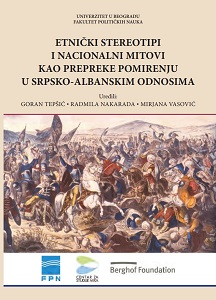
We kindly inform you that, as long as the subject affiliation of our 300.000+ articles is in progress, you might get unsufficient or no results on your third level or second level search. In this case, please broaden your search criteria.


It would be plausible to construct a ‘variety of communisms’ theory, categorizing the state-socialist economies not only by region but by historical epoch. China, for example, imitated the Stalinist model in the first years after the Revolution, but by the 1960s the PRC had developed its own unique social and economic institutions. The goulash communism of János Kádár’s Hungary, which took shape after 1956, differed drastically from the classical Soviet model. Nevertheless, during the last decades of state socialism, the communist societies were broadly on a convergence trajectory: the gap between Czechoslovakia or Hungary and the USSR, for instance, narrowed. State ownership of the means of production, the redistributive nature of economic integration and the political monopoly of the Communist Party created a homologous institutional environment. The system largely suppressed the legacies of pre-communist times.
More...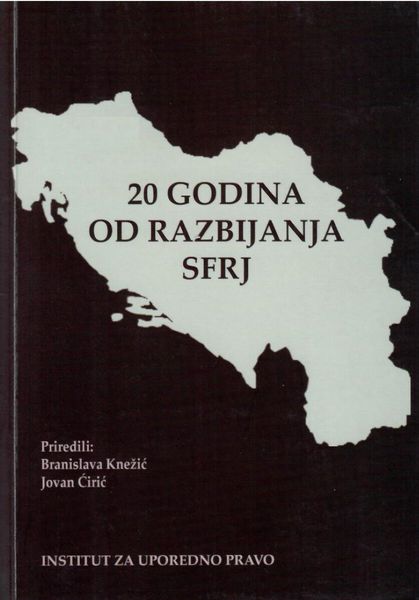
The problem of the relation of the Western World towards Serbs in the past two decades- refering not only to the problems of Kosovo and Metohia and the future of Republic of Srpska, the Hague or EU integrations, but also to the relation at more complex level- is not a result of Serbian idiosyncrasy, which do not match with clearly defined western principles. On the contrary, this problem is an outcome of some sort of the patology of postmodern Western world, that systematically deviates from those principles.
More...
The main goal of this book is the interpretation of the relationship between consent and majority voting, as the basis of the understanding of legitimacy in the modern era and the foundation of modern political philosophy. The author approaches this topic primarily by considering the theories of the classical theorists of the social contract, Thomas Hobbes and John Locke, as well as the criticism of this theory by David Hume. On the other hand, the book deals with the relevance of this topic for contemporary normative political theory and the theory of democracy. Some of the important problems faced by contemporary theories are how it is possible to determine which procedure of political decision-making is, normatively speaking, the most adequate for a political community, and which is the most adequate way to establish such a procedure.
More...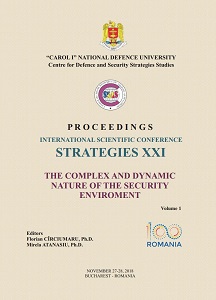
Over the last years, People’s Republic of China (PRC) has surpassed the United States of America (U.S.) as the world’s leading energy consumer and importer of oil.China’s relations with the Middle East become an important issue with global implications.This paper examines China’s interests in and its strategy towards the Middle East and what are the consequences for the U.S.. The aim is to find out to what extend China’s expanding presence in the Middle East poses a threat to the US security partnerships with Arab countries and the US military posture in the region. Even if China influence in the region has largely been economic, growing trade and investment also gives Beijing increased geopolitical stature. To achieve the intended purpose, the research framework will consist on a qualitative analysis based on case study method.
More...
Societal security, as developed by the Copenhagen Security School, is an extremely important area of the broader concept of a contemporary security approach that, in addition to military issues, also addresses a host of other threats from areas such as political,economic, societal or environmental ones. In the study of contemporary social security, a series of concepts specific to the theory of complex systems, such as complexity, self organization,chaos, etc., have been borrowed, which have substantially enriched the hermeneutics of the security discourse on the basis of non-traditional interpretations of social systems. This paper aims to present the basic concepts of complexity and their relevance to the theory and practice of contemporary societal security. At the same time, the paper presents some conclusions regarding the analysis methodology specific to the complexity science applicable to the field of societal security.
More...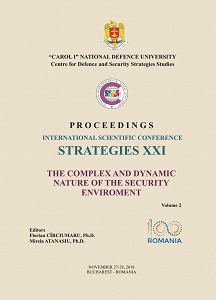
The HNS is both a category of logistic support applicable to Article 5 and Non-Article 5 scenarios type and a choice that must be carefully planned and organized to reduce the dependence of NATO missions on their logistical side. Thus, with the accession of local resources, it is obvious that the elimination of time necessary to bring these resources from other places is achieved, which reduces the time necessary for the deployment of troops participating in military activities in Joint Operation Area (JOA) and gives the fighting actions a much greater flexibility. In NATO doctrine, it is considered that the Host Nation Support plays an essential role in gaining decisive advantages over the opponents’ forces.The main purposes of this paper is to present how Host Nation Support (HNS) concept is understood and implemented by NATO member countries, also when our country can provide this type of logistical support, responsibilities assumed in terms of planning and providing HNS and the HNS management system of Romania.
More...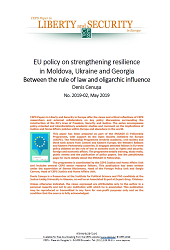
The state capture and oligarchic control of political power and electoral processes in the associated countries of the Eastern Partnership – Georgia, Moldova and Ukraine – are acknowledged by EUinstitutions, civil society organisations and in public opinion. That inevitably puts pressure on the resilience of these three countries, in addition to Russia’s aggressive campaigns, carried out with or without the use of conventional weaponry. This policy brief looks at the EU’s actions to invest in and consolidate the rule of law, in the direction of stimulating internal resilience. It provides a range of arguments supporting the idea that the EU is not sufficiently tackling the oligarchic influences inMoldova, Ukraine and Georgia. These are followed by timely recommendations for the EU institutionsto remedy the situation.
More...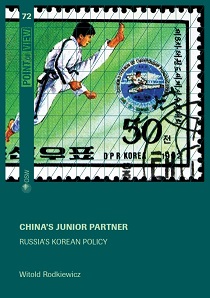
Russia’s long-term goal is to prevent the reunification of the Korean peninsula under the aegis of the United States and to weaken the US ’s position in the region. Its short-term goal is to avert the danger of an outbreak of armed conflict on the peninsula and the possible collapse of North Korea. Russia’s support for the reunification of the two Korean states is purely declaratory; in practice the Kremlin is striving to maintain the political status quo on the peninsula. At the same time, Russia wants to maximise its influence by developing economic relations and maintaining political contacts with both Koreas. Moscow does not view the denuclearisation of North Korea as one of its priorities. Its approach to Pyongyang’s nuclear programme is instrumental; in Moscow’s eyes, although the program poses certain risks for Russia, it also opens a number of opportunities. The course of the crisis so far has demonstrated that Russia does not have sufficient tools to influence the course of events. As a consequence, it has had to accept a role as China’s ‘junior partner’ in the Korean issue.
More...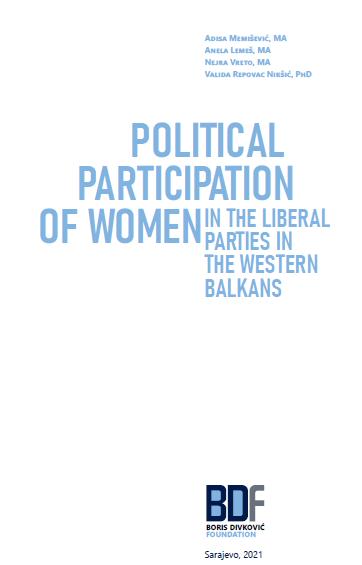
This research focuses on liberal parties in the region of Western Balkans and their strategies for advancement and promotion of gender equality, not just within the party but also in their respective countries. The aim of this analysis is to review the current standpoints on equal gender representation in politics in WB liberal political parties, to map their roles and strategies for advancement of gender equality, and to raise the visibility of successful regional examples. Political systems and legislative frameworks in Bosnia and Herzegovina, Montenegro and North Macedonia were reviewed and assessed through an in-depth analysis of their quota systems and the roles of the liberal political parties with to gender equality development, as well as the impact of the NGO sector. This research also examines and considers the social aspects of gender inequality in public and in decision-making processes. Previous research indicates that political parties often do not support female politicians’ participation in the processes of political programme development or political affirmation, despite having adopted gender equality policies in place. Research is conceptualised as a case study of three liberal parties in Bosnia and Herzegovina, Montenegro and North Macedonia and their strategies for development and promotion of gender equality within the party as well as in their respective countries. Comparative analysis was conducted using a mixed methods approach, combining qualitative analysis of primary and secondary data and quantitative analysis of primary data collection to triangulate the information to the extent possible. In order to develop the new regional story – Regional Initiative 50%– we need this research to examine intra-party democracy in these liberal parties, map their current views on gender equality and see what types of activities could be introduced and adjusted to the needs of their parties and party systems.
More...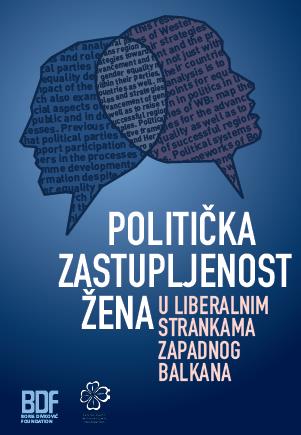
Fokus ovog istraživanja je na liberalnim strankama regije Zapadnog Balkana i njihovim strategijama za unapređenje i promociju rodne ravnopravnosti ne samo unutar njihovih stranaka, već i u zemljama njihovog djelovanja. Cilj analize je preispitati trenutna stajališta za ravnopravnu zastupljenost spolova u politici u liberalnim političkim strankama Zapadnog Balkana, mapirati uloge i strategije za unapređenje rodne ravnopravnosti u politici, i povećati vidljivost uspješnih primjera iz regije. Analiza političkih sistema i zakonodavnih okvira Bosne i Hercegovine, Crne Gore i Sjeverne Makedonije je također obuhvaćena ovim istraživanjem, kao i analiza sistema kvota i uloge liberalnih političkih stranaka u odnosu na razvoj rodne ravnopravnosti, uz osvrt na uticaj nevladinog sektora. Ovo istraživanje također ispituje i razmatra društveneaspekte rodne nejednakosti u javnosti i u procesima donošenja odluka. Prethodna istraživanja ukazuju na to da političke stranke često ne podržavaju zastupljenost članica u procesima razvoja političkih programa, niti političku afirmaciju bez obzira na usvojene politike rodne ravnopravnosti unutar same stranke. Istraživanje je koncipirano kao studija slučaja tri liberalne stranke Bosne i Hercegovine, Crne Gore i Sjeverne Makedonije i njihovih strategija razvoja i promocije rodne ravnopravnosti unutar samih stranaka, kao i u zemljama u kojima one djeluju. Uporedna analiza provodi se oslanjajući se na pristup mješovitih metoda koji kombinuje kvalitativnu analizu primarnih i sekundarnih podataka, kao i kvantitativnu analizu prikupljanja primarnih podataka radi triangulacije informacija u najvećoj mogućoj mjeri. Kako bismo mogli razviti novu regionalnu priču - Regionalna inicijativa 50%, potrebno nam je ovo istraživanje kako bismo ispitali unutarstranačku demokraciju unutar navedenih liberalnih stranaka i prikazali trenutna stajališta u vezi s rodnom ravnopravnošću, a u svrhu procjene koje bi se vrste aktivnosti mogle uvesti i prilagoditi potrebama samih stranaka i stranačkih sistema za razvoj rodne ravnopravnosti i bolje zastupljenosti žena u politici u budućnosti.
More...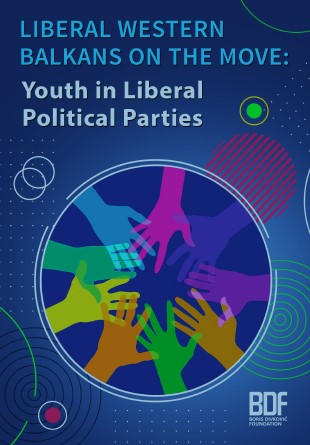
This research focused on liberal parties in the Western Balkans region and their strategies for the advancement and promotion of political participation of the youth, not just within the party but also in their respective countries. The aim of this analysis was to review the current standpoints on youth representation in politics in the liberal political parties of the Western Balkans, to map their roles and strategies for advancement of youth political inclusion, and to raise the visibility of successful regional examples. Political, legal and policy contexts and frameworks in Bosnia and Herzegovina, Montenegro, Serbia and North Macedonia were reviewed and assessed through the analysis of their quota systems, as well as through the overview of current youth representation in the parliaments of WB countries. Previous research indicates that political parties often do not support young politicians’ participation in the processes of political program development, despite having adopted youth programs and policies. The research was conceptualized as a case study of four liberal parties in Bosnia and Herzegovina, Montenegro, Serbia and North Macedonia and their strategies for development and promotion of political participation of the youth within the party, as well as in their respective countries. Comparative analysis was conducted using a mixed methods approach, combining qualitative analysis of primary and secondary data and quantitative analysis of primary data collection to triangulate the information to the extent possible. In order to develop the new regional story, we need this research to examine intra-party democracy in these liberal parties, map their current views on youth and politics and see what types of activities could be introduced and adjusted to the needs of their parties and party systems.
More...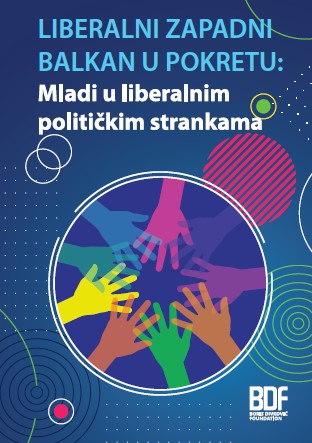
Fokus ovog istraživanja su liberalne stranke Zapadnog Balkana i njihove strategije za unapređenje i promociju političke participacije mladih, ne samo unutar stranaka, već i u njihovim zemljama. Cilj ove analize bio je sagledati trenutna stajališta o zastupljenosti mladih u politici u liberalnim političkim strankama Zapadnog Balkana, mapirati njihove uloge i strategije za unapređenje političke uključenosti mladih te povećati vidljivost uspješnih primjera iz regije. Politički i pravni konteksti i okviri Bosne i Hercegovine, Crne Gore, Srbije i Sjeverne Makedonije pregledani su kroz analizu njihovih sistema kvota, kao i kroz pregled trenutne zastupljenosti mladih u parlamentima zemalja Zapadnog Balkana. Dosadašnja istraživanja pokazuju da političke stranke često u praksi ne podržavaju učešće mladih političara u procesima izrade političkih programa, iako su usvojile programe i politike za mlade. Istraživanje je koncipirano kao studija slučaja četiri liberalne stranke iz Bosne i Hercegovine, Crne Gore, Srbije i Sjeverne Makedonije i njihovih strategija za razvoj i promociju političke participacije mladih ne samo unutar stranakaveći u njihovim zemljama. Komparativna analiza provedena je korištenjem mješovitih metoda: kombiniranjem kvalitativne analize primarnih i sekundarnih podataka i kvantitativne analize prikupljenih primarnih podataka kako bi se informacije triangulirale u najvećoj mogućoj mjeri. Kako bismo razvili novu regionalnu priču, potrebno nam je istraživanje koje ispituje unutarstranačku demokraciju u tim liberalnim strankama, mapira njihove trenutne poglede na mlade i relevantne politike, te sagledava koje bi se aktivnosti mogle uvesti i prilagoditi potrebama njihovih stranaka i stranačkih sistema.
More...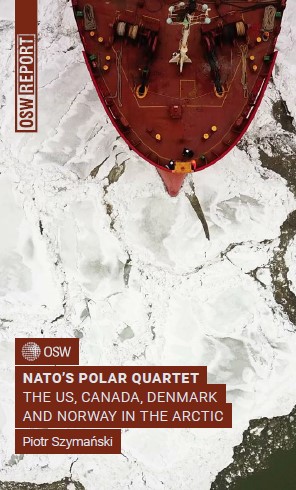
The name ‘Arctic’ comes from the Greek arktos, meaning ‘bear’; ancient people marked the north based on the position of the Great Bear constellation. Today, the Arctic is increasingly portrayed as a region, which lies in the ‘shadow’ of the bear. This of course refers to Russia, which has been steadily building up its military capabilities in the High North and investing in the development of the Northern Sea Route (NSR) and the extraction of Arctic resources. It also lays the most far‑reaching claims to the continental shelf around the North Pole.
More...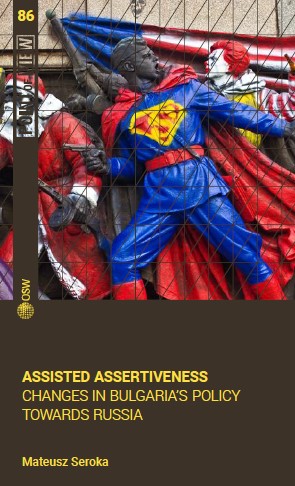
The Bulgarian public and elite has a positive attitude towards Russians and Russia, in part due to the historical and cultural background. This positive perception was not weakened by the period of Soviet domination. The pro‑Russian sentiment shared by the Bulgarian public facilitated the communist coup in 1944 and the ensuing Sovietisation of the state. Nor were the democratic changes initiated at the end of 1989 the result of the democratic opposition’s successes, but were rather down to the actions taken by the reformist faction within the Bulgarian Communist Party (BCP), a consequence of the decline of the USSR and the centrally planned economy model.
More...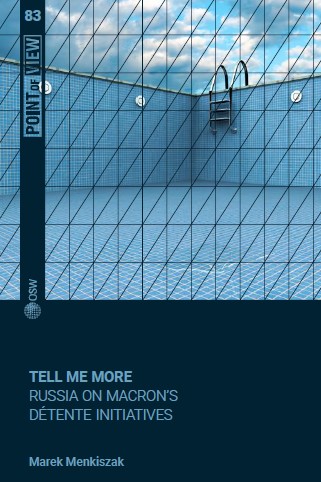
Emmanuel Macron took office as President of the French Republic in May 2017. In his statements, he has proclaimed the need to engage in dialogue with Russia and work with it to build an architecture of trust and security in Europe. This approach resulted from his diagnosis of crisis in the Western community and the growing assertiveness of non‑Western powers (including Russia), as well as his conviction that unless a modus vivendi with Moscow is found, it will be difficult to ensure the sovereignty and policy effectiveness of France and the entire European Union. The factors that have likely driven Macron also include a desire to promote French business in Russia, as well as an informal rivalry with Germany, which has traditionally played a central role in the EU’s political and economic relations with that country.
More...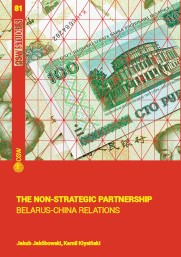
Relations between China and Belarus have been developing intensively over the past decade. This process has been fuelled by Beijing’s growing global ambitions as well as Minsk’s efforts to modernise the Belarusian economy and to partially reduce its dependence on Moscow. Increasing pressure from Russia and its inability to build closer relations with the West (which was mainly an effect of violations of human rights and the rule of law) prompted the Belarusian regime to seek alternative partners outside Europe. The aim was to increase its room for manoeuvre in foreign policy, as well as to gain additional sources of capital and new markets. Given China’s great economic potential and its interest in developing cooperation, Belarus mainly focused on China at the beginning of the 21st century, calling it a ‘close ally’. The cooperation gained momentum in the early 2010s, when China adopted a more proactive global policy after Xi Jinping had risen to power.
More...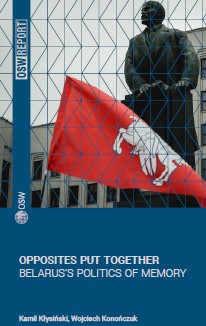
Immediately after 1991, the activity of nationalist circles in Belarus led to a change in the Soviet historical narrative, which used to be the only permitted one. However, they did not manage to develop a coherent and effective politics of memory or to subsequently put this new message across to the public. The modest achievements of the first few years of independence were wasted after Alyaksandr Lukashenka came to power. He ordered a return to the Soviet vision of history that was only slightly modified. The Byelorussian Soviet Socialist Republic (BSSR), recognised as the first Belarusian state in history, still remained its pivot. It was only at the dawn of the new century that the regime, which had radically dissociated itself from the national narrative, began to see a need for conducting a politics of memory that would not only be based on the Soviet legacy, but also on earlier periods of Belarusian history. In Belarus, governed as it is by an authoritarian regime, the politics of memory is determined primarily by the Presidential Administration, which in fact has a monopoly on shaping it. Neither the opposition, which is weak and fragmented, nor independent historians have a real say in formulating the message addressed to the citizens.
More...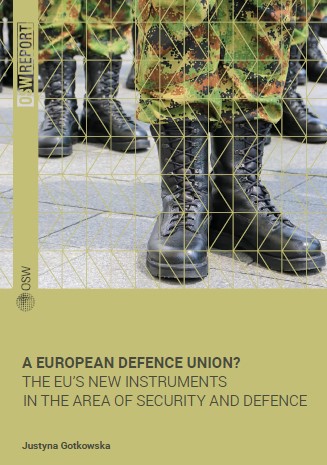
This report aims to present the evolution of the EU’s security and defence policy since 2016. Public debate on this issue often comes down to slogans about a ‘European army’, which in reality no‑one intends to create, or ‘European strategic autonomy’, a concept which has no clear definition. Discussions on the EU’s security and defence policy are much less often based on actual knowledge of the activities the EU is undertaking in this area, or the interests of individual actors.
More...
While the whole world turned its attention to the issue at the beginning of the refugee crisis, it is clear that due to the conditions of the corona virus epidemic, all countries give priority to the health of their own nations, the security of their borders, and put the refugee issue on the shelf once again. Considering the refugees as a secondary issue and giving more importance to the nation-state issues constitute the starting point of this study when we evaluate the process we are going through within the scope of the state of exception. According to Giorgio Agamben, the sovereign power may have the ability to suspend the law and/or delay the enforcement of the law in exceptional circumstances and times. Based on the Agamben’s analogy, refugees can also be seen as Homo sacer, as the Corona virus era can be seen as exceptional times and most countries direct their priorities towards their own land and people. This study aims to explain the conditions of Syrian refugees regarding the homo sacer analogy by comparing the two countries in terms of migration policies, the number of Syrian Refugees living in the country, religion, and types of immigrants. For this, Germany and Turkey will be analyzed with different parameters. Then, their social position in the country will be added as a variable to the equation of the work. The country's GDP level, population, religion, immigration policy and the arrival of refugees will be added as independent variables. The main research question of this study is "Is there a relationship between the social positions of Syrian Refugees and the structural features of the country?". This study aims to contribute to the migration literature by looking at it from theoretical perspectives that are rarely used, and by using mixed method in the data collection process.
More...